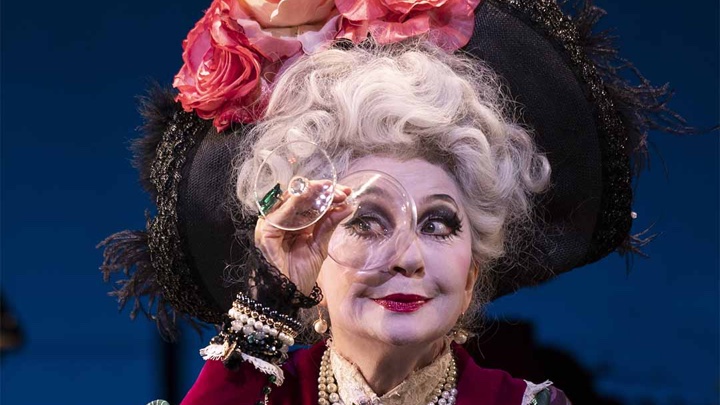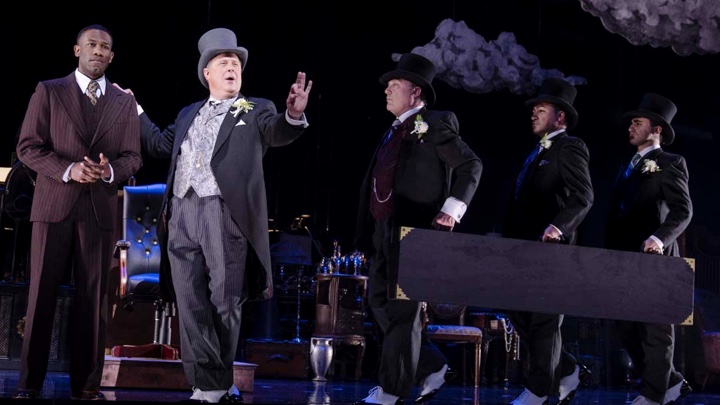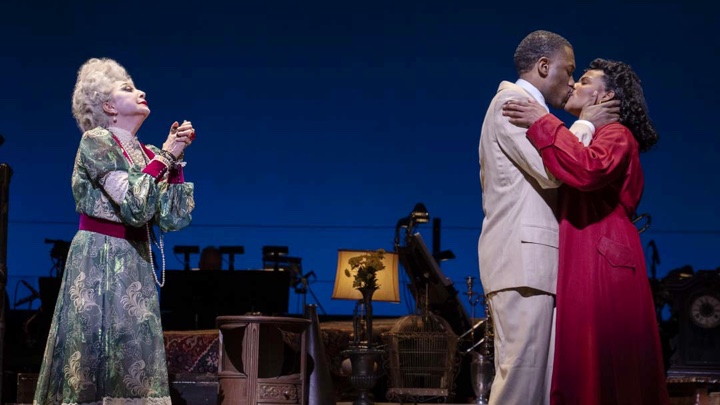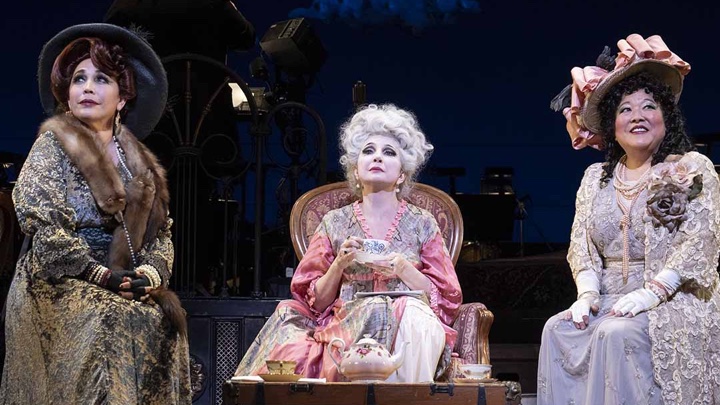

For these reasons and maybe a few more, it seemed inevitable from the beginning of the Encores! series in 1994 that they would present it. If there’s a surprise here, it’s that it took almost three decades to make it happen.
For me, any delay is more understandable now that I’ve seen it. In fairness, I should report that the crowd clearly adored Dear World. I can’t say the same.
Let’s start with the score’s best songs. These include “Kiss Her Now,” “And I Was Beautiful,” and especially the compelling, Jacques Brel-like “I Don’t Want to Know.” Not coincidentally, all three are for the Countess Aurelia (Lansbury’s role, of course). All are also bittersweet ballads (well, “I Don’t Want to Know” starts that way, at least)—a Herman specialty.
You might think such bittersweetness would inspire a conceptual approach to Dear World that incorporated some tristesse; perhaps also, a bit of restraint. Indeed, critics and audiences found the original production heavily overproduced.
But no. At Encores!, director Josh Rhodes seemed determined to push the show into cartoonish excess, turning Dear World into a kind of live action stage version of Ratatouille.
The work itself doesn’t help. Jean Giraudoux’s source play, La Folle de Chaillot, is a tonally complex evocation of Paris cloaked in the devastation of World War II, and probably a hard sell under any circumstances to contemporary audiences. (Note that it was last seen on Broadway in 1950, as The Madwoman of Chaillot in a translated version by Maurice Valency that further mucked with it, and the 1969 film with Katharine Hepburn as an Aurelia straight out of Miss Porter’s is a legendary disaster.)
Jerry Herman, who wrote the music and lyrics, and his libretto collaborators Jerome Lawrence and Robert E. Lee descend from Giraudoux’s original still further. Their way into this material is to provide touristy signifiers of French charm: accordion accompaniments, references to delicacies culinary and otherwise, etc. Did I mention there’s a mime? Of course there is. The story has significant dark corners about corporate greed, lost loves, aging and more—but here the dialogue is mostly positive-thinking aphorisms.
I wish the performances were enough to compensate, but mostly they were not. As the dastardly President, Brooks Ashmanskas shamelessly milked the crowd, nudging and winking at his own villainousness till it vanished entirely. Christopher Fitzgerald was all winsome cuteness as a sad-sack Sewerman. Stanley Wayne Mathis and Samantha Williams, playing young lovers Julian and Nina, sang well, but failed to give these essentially cardboard characters any dimensionality.
We were in better hands with the two supporting Madwomen: Ann Harada, deliciously individual and smartly underplaying as Gabrielle; and Andréa Burns, funny in wise-cracking old pro mode as Constance. Predictably, they stopped the show with their Act II counterpoint trio, though the number is so clearly engineered for an ovation that it feels obligatory even when deserved.
But in terms of wild applause, it was Donna Murphy as Aurelia who was front and center, exciting the audience to a fervor with each re-emergence on the stage. Murphy is every inch a musical theater star. Here she offered a masterclass in charm and grace from a bygone era. She was ravishingly lovely, as elegant as a ballerina, and just not right for the part.
If Dear World is to work at all, Aurelia needs a quirky, jagged eccentricity that is simply not in Murphy’s considerable arsenal. And though she was in very good vocal shape, the score—cunningly crafted to make frequent use of Lansbury’s fragile but hauntingly lovely head voice—doesn’t lie ideally for her. I was often aware of strategic choices of how to place individual notes to make the songs work. In “I Don’t Want to Know,” this also involved essentially deconstructing long phrases and robbing the piece of the increasing forward momentum it needs to make its point.
It pains me to write this, because in many ways this was a return to the original mission of Encores! that I so believe in: rescuing a show that has essentially faded from view, and putting it back together with a team of heavy-hitting professionals. Alas, Dear World proves unworthy of the effort, and in this case it was further disadvantaged with a treacly, twee production.
Next up at Encores!: Oliver!, where destitute but adorably plucky British orphans sing and dance their way into your heart. Buckle up—I sense a trend.




























Comments